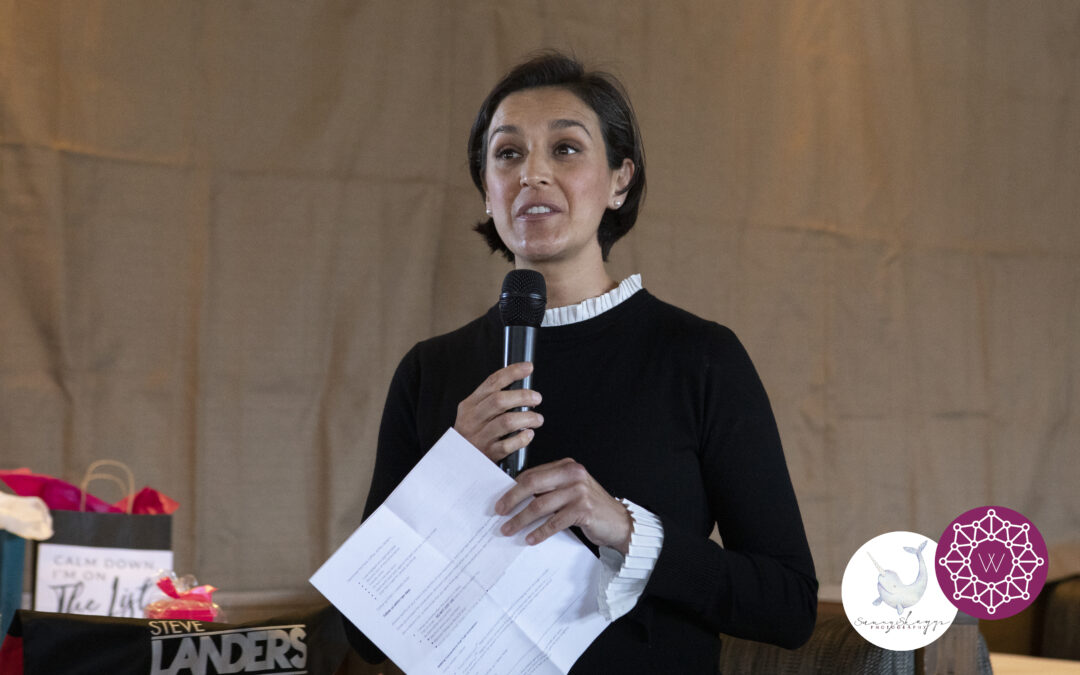When it comes to business, are you comfortable with the rules of etiquette? Or do you feel a little lost or unsure what “etiquette” really is?
Monica Herrera, founder of Proper Way Academy, generously shared her expertise at our February WIN luncheon. She founded her academy to be a place for both adults and children to learn the skills necessary for them to communicate better, consider others above themselves, and feel comfortable and self-assured in most social situations through the power of etiquette.
“Etiquette is not just for the elite,” Monica told us. Nor is it just good manners. “While manners are how you behave, etiquette is a set of rules to help you have better manners so people want to be around you.”
Etiquette also helps you “play the game.” Using the example of a soccer match (or “football” to Monica, who was born and raised in Mexico and has lived in North America, Europe, and Asia), she explained that only when you know the rules can you effectively play the game of business.
Monica shared that we have about seven seconds to make a good impression in social and business situations. Here are her tips for making the most of those seven seconds:
Placement, Posture, and Body Language
Only 7% of our communication is verbal. Another 35% is vocal (in our tone, etc.), and the other 58% is non-verbal, so body language is important.
Face the group, with an open posture to make yourself approachable. Your chin should be parallel to the floor; chin down looks submissive and chin up looks haughty. Keep your shoulders level and back; a hunched posture is not confident.
Smiling makes you approachable.
Eye contact is a sign of confidence and openness in the United States. In other countries, it may be seen as aggressive, so be culturally aware.
Mind your hands when you speak; too much movement or invading another’s personal space can make them uncomfortable. Personal space is another area where it is important to be culturally aware.
Self Presentation
Wear clothes that give you confidence, and follow the common advice to “dress for the job you want.” Avoid strong perfume or ostentatious jewelry: the focus is on you, not your ensemble.
While you may want to chew gum to freshen your breath, make sure to get rid of it before you enter a business event. Gum can be distracting, leading people to focus on your gum rather than on you.
Bring business cards, but don’t hand them out like confetti. If you think there is a possibility of a valuable connection with someone, you will give a better impression by asking for their card. (And they will likely ask for yours in return.)
Be mindful of other people’s time and don’t monopolize it. If you think it would be valuable to make a closer connection with someone, get their card and contact them for a one-on-one.
Introductions
Shake hands with a considerately firm grip: neither limp (which makes you seem passive or not interested in the other person) nor hard (which is aggressive). The position of your hand is also meaningful: keep it to the side of the other person’s hand, so that you don’t show submissiveness with your hand on the bottom or aggression with your hand on the top. Be cautious of bringing your left hand into the mix—enveloping the other person’s hand with both of yours can be seen as patronizing or controlling. That double-hand clasp can make someone feel that you are extra happy to meet them or feeling warm and concerned toward them, but it’s easy to misinterpret.
Keep your nametag on the right side, where the line of your right hand and arm draws attention to your nametag when you shake hands.
Show respect by standing up to shake hands. If you are stuck, as when you are in a restaurant booth, still make the effort to rise out of your seat.
In a situation where hors d’oeuvres are being served, eat with your left hand to leave your right hand clean for handshakes. To hold a wine glass, you can set it on your plate and use your thumb to stabilize the base. Eat a snack or small meal ahead of time, so that you can focus on the social and business interactions rather than trying to get enough to eat.
When introducing yourself, give your full name, which increases your image of confidence and professionalism. To help you remember another person’s name, try to use it as many times as you can without being awkward. And if you do need a reminder, ask them, “Would you remind me of your name?” rather than “I forgot your name,” which makes them feel unimportant.
Phones
Put your phone away, on silent, to show that you are focusing on the people who are present. If you absolutely must be available to take a call or manage a text, let the people around you know in advance.
Language
Coarse language is not appropriate for business, and can give the impression that you have a lesser education and are making up for a small vocabulary. While some workplaces are becoming more comfortable with the use of swear words, it is always safer to keep your language clean and appropriate when entering any business situation.
The Big Picture
What really matters is how you make people feel. Etiquette helps you know how to make others feel respected and kindly treated. But more than knowing all the rules, being kind, thoughtful, and considerate is how we make strong connections and good impressions.
Monica ended her speech with a touching personal example of the power of kindness. She recently had to travel for a family funeral, and her plane had been delayed and arrived late to her destination. When she informed the airplane staff that she was in danger of not making it to the funeral, they asked everyone on the plane to stay seated and let her disembark first. “All those people were also late,” she said, “But they showed so much kindness and respect for my situation.”
What rules of etiquette have helped you feel more comfortable and confident? Let us know below, and remember to join us for our next WIN Luncheon!
Monica Herrera was born and raised in Mexico, and she has been fortunate to live in North America, Europe, and Asia. This exposure to other cultures gave her the opportunity to experience firsthand the beauty and refinement found in different societies and customs around the world. She is a proud Centerton resident along with her husband and four children.
Monica received her certification as an Etiquette Instructor from the prestigious American School of Protocol. She has a Bachelor’s degree in Hospitality from the renowned ESDAI at the top-rated Universidad Panamericana in Mexico City. She also attended the Conrad N. Hilton College of Hotel and Restaurant Management at the University of Houston to broaden her experience.

Genet Jones, owner of The Thoughtful Wordsmith, has been writing for fun since 1989 and for profit since 2005. She also enjoys editing (yes, really), yoga, mountain biking, and exploring Northwest Arkansas.

